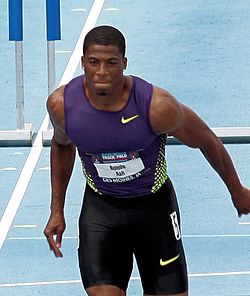 | ||||||||||||||||||||||||
| Personal information | ||||||||||||||||||||||||
|---|---|---|---|---|---|---|---|---|---|---|---|---|---|---|---|---|---|---|---|---|---|---|---|---|
| Nationality | | |||||||||||||||||||||||
| Born | July 2, 1988 | |||||||||||||||||||||||
| Height | 6 ft 2 in (188 cm) [1] | |||||||||||||||||||||||
| Weight | 207 lb (94 kg) | |||||||||||||||||||||||
| Sport | ||||||||||||||||||||||||
| Sport | Running | |||||||||||||||||||||||
Event | 110 metres hurdles | |||||||||||||||||||||||
| College team | Bethune-Cookman Wildcats and Oklahoma Sooners | |||||||||||||||||||||||
Medal record
| ||||||||||||||||||||||||
Ronnie Ash (born July 2, 1988) [2] is an American track and field athlete specializing in hurdles. With his 12.99 (+1.2) 110 metres hurdles on June 29, 2014 in a semi-final round of the USA Outdoor Track and Field Championships in Sacramento, California, he moved into the prestigious sub 13 club and is currently the 17th fastest hurdler in history. [3]
Ash did not finish in the final. [4] Later in the season, Ash was silver medalist at the 2014 IAAF Continental Cup, [5] selected to the team because his time held up as the #2 time from the countries that make up the Americas team for the season. [6]
He reached the 2016 Olympic final and was in contention for a medal before stumbling over the final hurdle and falling. He was ultimately disqualified for an illegal hurdle clearance under then IAAF rule 168.7b.
